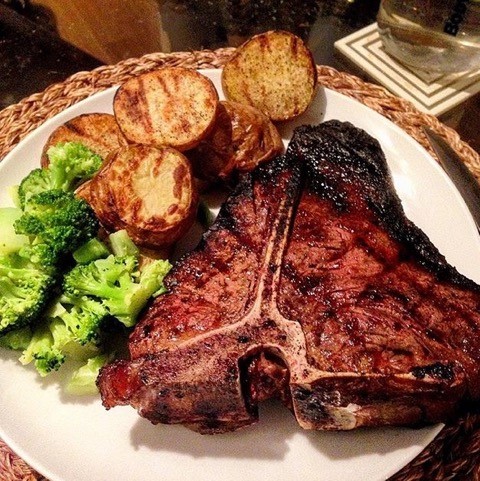Now that you have a fridge full of nutritious foods and a better understanding of how to determine how many calories to consume to meet your goals, let’s go into some more detail about what actually composes the foods you’re eating.
All the nutritional content of food can be broken into two groups:
- Macronutrients
- Micronutrients
Macronutrients are your protein, carbs and fats, and are where you will be getting the energy content (calories) of your diet. Most of the actual weight of the food you consume comes from your “macros” and these nutrients are usually measured in grams. Micronutrients are vitamins and minerals, all found in very small amounts (milligrams) in your food. Most of these come from fruits, veggies, and whole grains.
 We’re going to discuss macros today. You can refer back to my first blog to see which foods are categorized as which macronutrient, but for the most part, plant-based foods will be primarily carbs, and animal primarily protein, with fats coming from both food sources. Each macronutrient has a very specific role in how your body functions.
We’re going to discuss macros today. You can refer back to my first blog to see which foods are categorized as which macronutrient, but for the most part, plant-based foods will be primarily carbs, and animal primarily protein, with fats coming from both food sources. Each macronutrient has a very specific role in how your body functions.
Protein
Proteins are the building blocks of your body. Pretty much all lean (non-fat) tissue in your body is comprised of protein, therefore it is the most important macronutrient. When you exercise, you are actually damaging the muscles and connective tissues in your body, so to repair those damaged tissues you need to consume adequate protein. The more intense your workouts are, the more damage you cause to your body, so the greater your protein needs become. Our bodies are constantly breaking down protein as well as undergoing protein synthesis. We always want to be on the positive side of this equation or else we will lose muscle mass.
There are numerous studies out there with conclusions on how much protein we need, but the sum of them basically gives us a range from 0.8g of protein per kg of bodyweight to 2.2g of protein per kg of bodyweight, in other words .37g per pound to 1g per pound. On nutrition labels, total daily allowance for protein is often shown as only 50-60g. This is based on a 2000 calorie per day diet for a 150 lb sedentary person, so that number is right there for the bottom end of their needs. For someone with a more active lifestyle or who weighs more, that number will be significantly higher.
Fat
Fat is our body’s most efficient energy source, meaning we can get the most energy out of each gram of fat (9 calories compared to 4 for carbs and protein). When we are at rest, our body is best suited to utilize fat for energy, and can use this fat metabolism pathway basically indefinitely. Fat also helps regulate our hormone levels. A hormone called leptin is actually released by fat to help regulate our hunger, so if your dietary fat intake is chronically low or your body fat levels are towards the minimum essential amount (as mine are when dieting down for a bodybuilding show) you will be chronically hungry even though you might be eating a relatively large amount of food.
Fat also acts as our main source of stored energy, hence why we hold body fat. Until relatively recently in human history, we needed those fat stores in times of famine. Your fat intake will usually be inverse to your carb intake if you would like to maintain or lose weight, so a high fat diet would usually indicate a lower carb intake, and vice versa. At minimum you should aim for roughly 20% of your calories to come from fat, but again this number can be far higher if your carbs are low.
Carbohydrates
Carbs are actually the one macronutrient that we don’t technically need to consume. Our body can actually create its own glucose (stored form of carbs) by breaking down protein, and it can also create something called a “ketone”, which acts as a carbohydrate “clone” if you will, out of fat when carb intake is low for a long period of time. That being said, if you are an active person you definitely still want to consume an adequate amount of carbs (which will vary immensely person to person) as the energy system we use primarily for high intensity exercises runs primarily on carbs. We store carbs in our muscle tissue and our liver, and if we consume too many calories we can also convert them into fat to be used later.
Carbs have lately gotten a bit of a bad rap for whatever reason. Know that if your total calories are controlled, it really doesn't matter if you go high fat/low carb or low fat/high carb as far as weight loss goes. However, since carbs are the body’s preferred fuel source for high intensity exercise, if you are a highly active person you would want to keep your carb intake relatively high. This way, you’ll have more fuel to perform better in your workouts which will in turn help you reach your training goals more efficiently.
In my next post, I’ll go into greater detail of how to optimally time your macronutrient intake now that you have a better understanding of their primary functions. Please comment with any questions or topics you’d like me to cover in more depth in future posts, and don't hesitate to reach out to me directly as well!
The Chopping Block's Wellness Chef Alia Dalal gives you ideas for eating well with protein and fats in her Clean Eating classes which include Plant-Powered Protein, Filling Fats and Very Vegetable. A couple of spots just opened up in her Clean Eating Boot Camp on Saturday, April 22 at Lincoln Square. This day-long class is the optimal clean eating experience!











